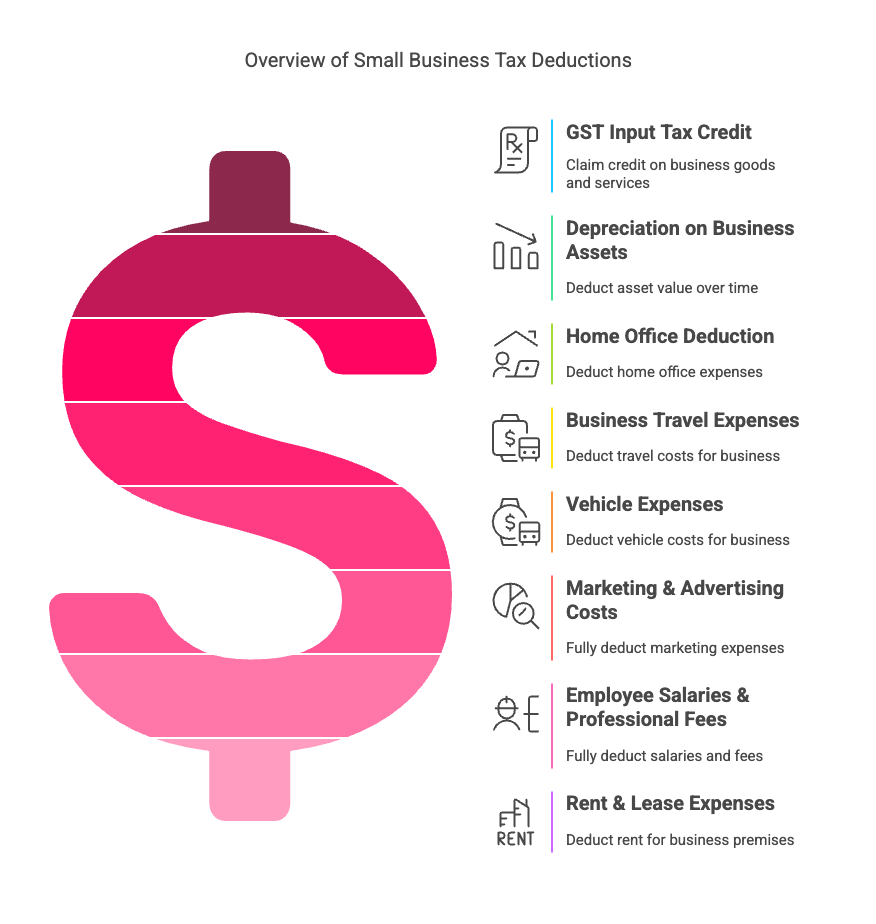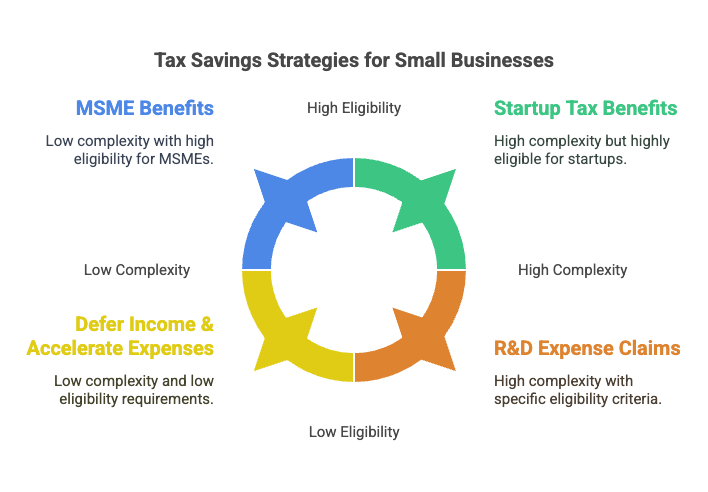Small Business Tax Deductions & Savings Tips
March 31, 2025
Home > Knowledge Hub > Small Business Tax Deductions & Savings Tips
Introduction
Managing taxes efficiently is crucial for small businesses. Understanding tax deductions and savings strategies can help reduce taxable income and improve cash flow. Here are some essential tax deductions and money-saving tips for small business owners.
Common Small Business Tax Deductions
1. GST Input Tax Credit (ITC)
Businesses registered under GST can claim input tax credit on goods and services used for business purposes, reducing their overall tax liability.
2. Depreciation on Business Assets
Under the Income Tax Act, businesses can claim depreciation on assets like machinery, computers, and office equipment, reducing taxable income.
3. Home Office Deduction
If you use a part of your home exclusively for business, you can claim deductions on rent, utilities, and maintenance.
4. Business Travel Expenses
Travel expenses for business purposes, including airfare, accommodation, food, and local transport, are deductible.
5. Vehicle Expenses
If a vehicle is used for business, expenses like fuel, maintenance, and insurance can be claimed as deductions.
6. Marketing & Advertising Costs
Expenses related to branding, digital marketing, social media ads, and promotional materials are fully deductible.
7. Employee Salaries & Professional Fees
Salaries, professional fees paid to consultants, accountants, and legal advisors, are fully deductible.
8. Rent & Lease Expenses
Rent paid for office or shop premises is deductible under Section 37(1) of the Income Tax Act.
9. Loan Interest Deduction
Interest paid on business loans, MSME loans, or overdrafts is deductible under the Income Tax Act.
10. Insurance Premiums for Business
Premiums paid for business insurance, including liability and property insurance, are deductible.

💰 Tax Savings Strategies for Small Businesses in India
1. Opt for Presumptive Taxation Scheme (PTS)
Businesses with turnover up to ₹2 crore (for non-service businesses) or ₹50 lakh (for professionals) can opt for PTS under Sections 44AD and 44ADA to simplify tax filing and reduce tax liability.
2. Take Advantage of MSME Benefits
Registering under the MSME Act provides tax exemptions, subsidies, and priority lending benefits.
3. Invest in Tax-Saving Instruments
Small businesses can reduce tax liability by investing in PPF, NPS, and tax-saving fixed deposits.
4. Claim Startup Tax Benefits (Section 80-IAC)
Eligible startups recognized under DPIIT can claim a 100% tax exemption on profits for three consecutive years out of the first ten years.
5. Use the Benefit of Lower Corporate Tax Rates
Companies opting for Section 115BAA pay a reduced corporate tax rate of 22% (plus surcharge and cess).
6. Claim Research & Development (R&D) Expenses
Businesses engaged in innovation can claim R&D expenses as deductions under Section 35 of the Income Tax Act.
7. Avail State Government Incentives
Many state governments offer tax rebates, subsidies, and incentives for MSMEs. Check with local authorities for benefits.
8. Defer Income & Accelerate Expenses
Deferring income to the next financial year while prepaying expenses can help reduce taxable income.
🛠️ Tools to Help with Small Business Taxes in India
- ClearTax – For GST compliance, tax filing, and IT returns.
- Zoho Books – For managing accounts and tracking expenses.
- Income Tax e-Filing Portal – Official government portal for filing income tax returns.

📌 Final Thoughts
Understanding and utilizing available tax deductions and savings strategies can significantly benefit small businesses in India. Always consult a tax professional to ensure compliance and maximize tax benefits.